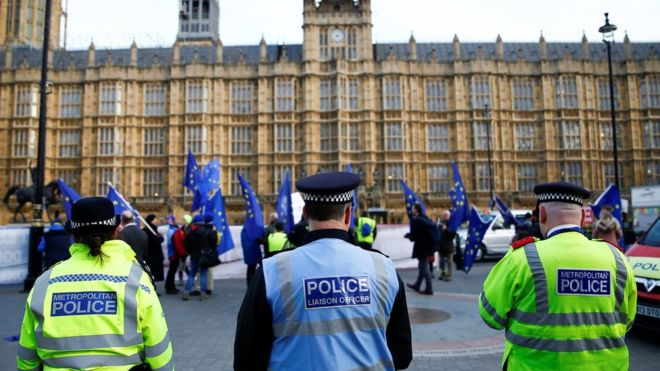Brexit: What preparations are being made for a no-deal?

It could become the UK’s biggest peacetime emergency in almost a century.
Unless a withdrawal agreement is approved (or Article 50 is delayed), at 23:00 GMT on 29 March the UK will leave the European Union with no negotiated exit – and in a second everything will change.
Suddenly British goods going to the European Union will be subject to duty (a payment, for example on imports and exports), and will need to be checked for compliance with things like sanitary regulations.
Goods arriving in the UK from the EU could face checks too, though the government has said it will not do that straight away, partly because it doesn’t have the infrastructure.
The rules around things like fishing rights, air traffic and nuclear regulation will all change in the blink of an eye too.
The effect is likely to be a severe slowdown on the critical Dover-Calais ferry and Channel Tunnel routes, as well as unpredictable delays at airports.
Critical incident declared
An army of civil servants has been working on the problem since the EU referendum.
At the time of writing, around 4,000 had been moved into positions where they are preparing for the no deal scenario. As we get closer, another 5,000 will be transferred across to help.
On the night of Brexit, the government is expected to declare a “critical incident” and to start operating 24 hours a day, seven days a week in a “command and control” mode.
The Cobra emergency committee will meet at the Cabinet Office as ministers sit down to tackle the unpredictable effects of leaving the EU without a deal.
The Ministry of Defence has promised to make 3,500 service personnel available to help. Around 10% of these will be reservists. An order laid before Parliament under the Reserve Forces Act said that they can be called upon from February 10.
There are 14 military planners already working in other Whitehall departments.
But despite all that, the chief executive of the civil service, John Manzoni, still concedes that a no-deal Brexit could be a “bit bumpy.”
Transport through Kent
The biggest concern is that lorry traffic across the English Channel through Dover and the Channel Tunnel terminal near Folkestone will grind to a standstill.
To manage that, Highways England, Kent County Council and Kent Police have come up with Operation Brock – a plan for parking up to 13,000 trucks.
(Read the full story here: BBC News)

